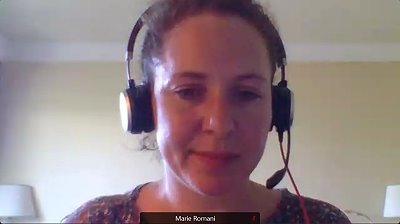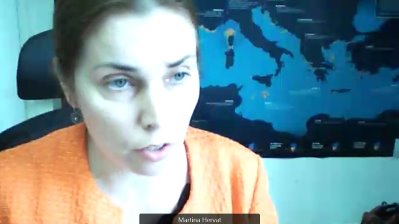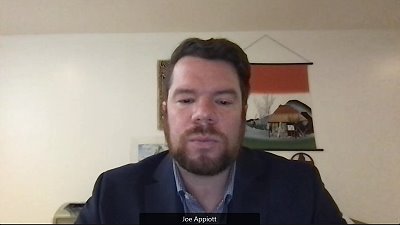 The European Parliament's Intergroup on ‘Climate Change, Biodiversity and Sustainable Development’ convened a webinar titled “European marine cooperation in the Mediterranean and beyond: networks of marine protected area managers, key allies!” that took place on 12 May 2022. MEPs Catherine Chabaud and Stéphane Bijoux sponsored the webinar. This was the first of three planned events aiming to provide the opportunity to discuss the EU marine ambition with the idea of a One Blue Belt. This should be achieved, among others, by boosting international cooperation between networks of MPA managers across the globe to achieve Post 2020 marine conservation targets.
The European Parliament's Intergroup on ‘Climate Change, Biodiversity and Sustainable Development’ convened a webinar titled “European marine cooperation in the Mediterranean and beyond: networks of marine protected area managers, key allies!” that took place on 12 May 2022. MEPs Catherine Chabaud and Stéphane Bijoux sponsored the webinar. This was the first of three planned events aiming to provide the opportunity to discuss the EU marine ambition with the idea of a One Blue Belt. This should be achieved, among others, by boosting international cooperation between networks of MPA managers across the globe to achieve Post 2020 marine conservation targets.
This first event was mainly focused on the capacity of networks of MPA managers to support EU policies implementation, in the Mediterranean and other European Seas. It was coordinated by MedPAN in the framework of the Interreg-Med MPA NETWORKS project and in collaboration with the EU Ocean Governance project.
According to the latest assessment (Protected planet 2020), the past decade has seen substantial gains in protected areas coverage. The greatest growth over the 10-year period has been in marine and coastal areas, where 68% of the protected areas is less than ten years old. Further efforts are, however, much needed to ensure that all areas of importance for biodiversity and ecosystem services are conserved: 33.9% of marine Key Biodiversity Areas remains outside protected areas coverage, recently established MPAs have not yet had the time to restore ecosystem health and, most importantly, despite the best intentions, many MPAs are formally established, but suffer from poor surveillance and enforcement of rules.
 "MPA networks contribute unarguably to marine biodiversity conservation and the Sustainable Development Goals (SDGs) through three main ways (WCPA/IUCN, 2007):
"MPA networks contribute unarguably to marine biodiversity conservation and the Sustainable Development Goals (SDGs) through three main ways (WCPA/IUCN, 2007):
- An MPA network can help to ensure marine ecosystem function by encompassing the temporal and spatial scales at which ecological systems operate. Ecosystems, habitats and species rarely correspond indeed to political or jurisdictional boundaries. They therefore require cooperative management among states, regions, nations, and jurisdictions.
- An MPA network can support that reasonable uses can occur with minimal conflict. In addition, as social network, it provides valuable technical support in sharing tools, knowledge and offering capacity-building services, it supports collaboration and cooperation among practitioners and decision-makers.
- An MPA network facilitates the efficient use of resources by preventing duplication of effort. It can also catalyse funding opportunities. Representative networks of MPAs also provide a cost-effective means of safeguarding large-scale processes while delivering local benefits.
This highlights and underlines the fundamental human dimension of MPAs networks. As stated by the United Nations Environment Programme already a decade ago (UNEP-WCMC/UNEP, 2008), social and learning MPA networks, comprising managers and other MPA practitioners and linking different institutions, are essential catalysts and facilitators for the development of ecological networks of MPAs."
"... An MPA network approach is also needed to ensure effective MPA management, within the broader landscape and seascape, and to address common conservation challenges and objectives, for instance migratory species and climate change. Networks support effective governance of oceans as they build “MPA community” by connecting managers, management authorities, local stakeholders as well as scientists and donors towards a similar overall goal. Networks of managers also contribute to improve MPA-related policies and other sectoral policies at national and international level as they make the link between experiences on the ground (and in the sea) and decision-making processes."
 Over the years, MPA practitioners have come to realize that working together would help address some of the challenges they face and MPA managers networks such as MedPAN have emerged and developed.
Over the years, MPA practitioners have come to realize that working together would help address some of the challenges they face and MPA managers networks such as MedPAN have emerged and developed.
The European Interreg-Med “MPA NETWORKS” project was set up in 2019 to boost this dynamic with the strengthening of MPA managers networks at all levels in the Mediterranean. The expected result is that MPAs are empowered to serve their purpose and deliver the results that will benefit nature and sustain our livelihoods.
The MPA NETWORKS project focuses on providing sustainable solutions to challenges requiring an approach that often goes beyond MPA boundaries. The project has helped to support creation and strengthening of national (in Croatia, France and Spain) and sub-regional (in the Adriatic) networks of MPA managers and cooperation between networks at Mediterranean level, including cooperation with MedPAN. The Croatian final conference is scheduled for 1-2 June 2022 in Zagreb. More information about this project is available here.
 The event was quite useful in drawing attention to the valuable projects currently underway, but also brought back the need for more and more stable institutional and financial support to the MPAs. The failure to provide such support is at the origin of missing the Aichi targets for protection under the Convention on Biological Diversity (CBD) as highlighted by Joe Appiott of the CBD Secretariat. He outlined the Post 2020 Biodiversity Process which should lead to new objectives and commitments at the forthcoming Conference of the Parties (COP) to CBD in Kunming later this year. He recognised that networks of managers were an important approach to close the considerable effectiveness gap that persists. As many protected zones have been declared only recently, they are not yet mature and more time will be required for them to realise their full potential under conditions of strong protection. This is why sustained public support is essential and restoration and protection efforts need to reach out well beyond 'the usual suspects' and deeply into all societies.
The event was quite useful in drawing attention to the valuable projects currently underway, but also brought back the need for more and more stable institutional and financial support to the MPAs. The failure to provide such support is at the origin of missing the Aichi targets for protection under the Convention on Biological Diversity (CBD) as highlighted by Joe Appiott of the CBD Secretariat. He outlined the Post 2020 Biodiversity Process which should lead to new objectives and commitments at the forthcoming Conference of the Parties (COP) to CBD in Kunming later this year. He recognised that networks of managers were an important approach to close the considerable effectiveness gap that persists. As many protected zones have been declared only recently, they are not yet mature and more time will be required for them to realise their full potential under conditions of strong protection. This is why sustained public support is essential and restoration and protection efforts need to reach out well beyond 'the usual suspects' and deeply into all societies.
See the final agenda of the first EP-MPA webinar with the indication of all speakers and their topics here. The recording, final report and the slides of all speakers can be accessed on the event website.








